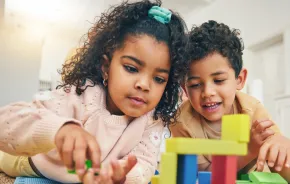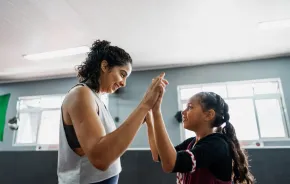 For Lindsay Fisher of Vancouver, Wash., talking about death is a part of life. Fisher works as a funeral director at her family’s funeral home, Evergreen Memorial Gardens, and often brings her sons, 5-year-old Jack and 2-year-old Will, to work.
For Lindsay Fisher of Vancouver, Wash., talking about death is a part of life. Fisher works as a funeral director at her family’s funeral home, Evergreen Memorial Gardens, and often brings her sons, 5-year-old Jack and 2-year-old Will, to work.
“Both boys have grown up with words like ‘died,’ ‘funeral’ and ‘cremation,’” says Fisher. “One of Jack’s earliest words was ‘casket’!”
Sound shocking?
It shouldn’t. Experts say that discussing mortality with children early and often promotes a healthy approach to loss. But most parents aren’t as well versed as Fisher in the delicate topic of mortality. In fact, few topics inspire more parental hesitation than death and dying.
“We talk to our kids about sex, their bodies, and stranger danger, even though those are tough conversations, because we know the benefit to kids is huge,” says Sarina Natkin, L.C.S.W., a Seattle-based parent educator and coach. But when it comes to mortality, she says, parents falter.
Well-meaning moms and dads dodge the topic because they don’t want to scare young children or dwell on the morose. But avoiding the subject can actually do more harm than good, especially if children sense the topic is off-limits. After a loss, the worst thing that could happen is for there to be no discussion, says Jill Cole, D.S.W., a family therapist in Seattle. “This leaves the child to fantasize and imagine the worst, with nobody to talk to.”
Talking the talk
The good news: Many parents do attempt to talk with kids about death and mortality, says Natkin. Unfortunately, the “talk” may be an ambiguous two-step, with parents dancing around the issue with verbal inventions (“Rover lives on a beautiful farm now!”) or murky euphemisms such as “He went to sleep” or “We lost him.”
The desire to gloss over the grisly realities is natural and normal, says Natkin.
“As parents, we have an innate desire to protect our children, and that’s a good thing.” But in this case, parents’ protective instincts can lead them astray. The best approach, she says, is a straightforward one: “I encourage parents to talk about mortality using words like ‘died’ and ‘dead’ in a very natural way. Flowers die, insects die, and so do people. Using factual language from early childhood on builds a cognitive model that frames death as a natural part of life.”
When parents trade euphemisms for plain, straightforward language, children are more likely to grasp the situation. Common expressions such as “passed away,” “gone” or “lost” can confuse and scare young children, who lack the worldly context needed to decipher these phrases.
“Kids hear the word ‘lost’ and think losing a person is like losing a toy,” says Fisher. “It makes it difficult for them to understand what really happened.” Never tell children that a loved one “went to sleep,” she says. “It’s terrifying to a young child to think he might go to sleep and never wake up. In this case, the easy answer isn’t the best one.”
Grief, age by age
How parents approach the topic — and how children respond — depends on each child’s age and developmental maturity. Natkin tells parents to begin the conversation in toddlerhood. “I don’t think there’s an age that’s too young to start using the words ‘death’ and ‘dying.’ The more we normalize those words, the less taboo they are.”
Toddlers and preschoolers have a shaky concept of permanence and may not understand that a loved one is gone for good, says Natkin.
To communicate the concept of “forever,” parents can use phrases like “He’s dead, and we’re not going to see him anymore” and accept that it may take months for children to fully grasp the idea that their friend, relative or pet isn’t coming back.
Grade-school children are often fascinated by the biological aspects of death, such as burial, decomposition and cremation, and may ask questions parents deem gory (“Are worms eating her body?”).
Teens may act indifferent, hide emotions, or talk to friends and teachers instead of parents.
No matter what kids’ ages are, Donna L. Schuurman, Ed.D., executive director of The Dougy Center — the National Center for Grieving Children & Families in Portland, Ore., recommends bringing up the topic instead of waiting for children to ask about it. This lets kids know that the topic is fair game for discussion. Schuurman advises parents to start with a phrase such as “Grandma died, and I’m feeling sad. I’m going to miss her very much.”
Focus on sharing your own feelings, instead of telling children how they “should” or “must” be feeling, says Cole. “You don’t really know how children are feeling. Talking about your own experiences or generalizing the family’s experience (for example, saying, ‘This is a hard time for all of us’) draws a child out, opening the door for questions and conversation,” she notes.
What about oversharing? Is it possible to say too much about death with a child?
Generally speaking, if a child asks a question, he’s ready for a straightforward answer, says Schuurman. “Don’t answer questions they’re not asking. Developmentally, they’re asking what they feel they need to know.” To keep information age appropriate, answer kids’ questions naturally and factually as they arise, without embellishing or adding extra information.
Coping with loss
Does grief follow a normal path for children?
Yes and no, says Cole. For a month of two after a death, parents may see some typical grieving behaviors: social withdrawal, moodiness, change in appetite and a seeming fascination with death and the deceased. But don’t assume that all kids will experience a loss in the same way or process grief on a predictable timeline, she says. “There is no normal pattern for grief, and it will look different for each child.”
For most children, these behaviors resolve themselves within three to six months. But 10 to 15 percent of children experience bigger problems after a loss, says Natkin. If children start lashing out, sleeping poorly, experiencing nightmares, losing or gaining weight, or talking about harming themselves or joining the deceased, it’s time to look into professional grief support, she notes.
When grief seems troubling or excessive, the first step is talking to a child’s pediatrician, says Cole. “A family doctor or pediatrician who knows the child is a good sounding board for concerns over grief. From there, appropriate recommendations can be made for the next steps. Excellent grief support is available, and it would probably be helpful for the family or the child to see a professional.”
Whether the deceased was a relative or a cherished pet, the key to guiding kids through grief is offering real choices about their involvement in death’s aftermath. Allowing kids to choose how involved they want to be and whether to attend memorial services or rituals is empowering and includes them in the family’s grieving process.
Young children who opt to attend funerals should be prepared in advance for what they’ll experience, notes Natkin. “If mom and dad might be sad or crying at the service, tell the child what they’ll see.” Grieving parents who worry about their ability to comfort their child at the service can bring another support adult or “buddy” to stay by the child’s side.
Rituals help
Of course, not all families choose to hold funerals or memorial services. But Schuurman says that rituals like these are especially important to children. “I think it’s a mistake to not have some kind of punctuation of major events in children’s lives,” she says. “It’s not closure, but it’s punctuation. It’s saying, ‘We’re in this together. It happened. He mattered.’”
After a loss, children may crave answers to big-picture, existential questions about life and death, from “Where is he now?” to “What happens after death?”
“By age 15 or so, children totally ‘get’ death cognitively, but they are only starting to grapple with spirituality and the bigger meaning of life,” says Natkin.
Most religions have rites and rituals around death, with good reason — spiritual beliefs and rituals can help children cope with a loss by creating vital context for grieving children, says Natkin. “Rites and rituals elevate our daily lives to something bigger. They connect us to our past, our future, and help us identify who we are in the present.”
But nonreligious families can still address kids’ spiritual needs by creating their own unique ways to memorialize a loss.
Families can explore how different cultures deal with death; perhaps a ritual from another culture will resonate. A small, private ceremony can consist of lighting a candle and allowing each person to share something about the person (or pet) who died, releasing a balloon, paper boat or message in a bottle, or planting a tree.
Carving out regular time to remember the deceased with a monthly or annual ritual — such as dining at the person’s favorite restaurant or hiking his favorite trail — can be helpful to children, says Natkin. “It’s acknowledging that the loss doesn’t end when the initial grief process does, and that there will always be a place and time for remembering, even when time has passed.”
Fisher’s professional life in the funeral industry became personal two years ago when her grandfather Will, a fixture in the family business, suffered a massive heart attack at work and died. Jack, then 2 and a half, had a special relationship with his great-grandfather, says Fisher. “We all worked together, and Jack passed many hours in his office sitting on his lap.”
“Jack was at the hospital when he died, and he attended the funeral with the family,” says Fisher. But for weeks afterward, Jack would run back to Grandpa Will’s office to see if he was there and ask when he was coming home. “Each time, I would tell him that Grandpa died and was in heaven. Having the conversation over and over again was painful. But I could see the contented look on Jack’s face when he finally understood.”
Talking about life’s end isn’t easy, notes Natkin, especially when a death comes on suddenly or when a child’s grieving doesn’t follow a standard path. But the payoff is infinitely rewarding. “In the end, talking about death gives children a fuller experience of life.”
Malia Jacobson is a Tacoma-based freelance writer and mom of two
The loss library
Sarina Natkin, L.C.S.W., recommends the following books for children and adults.
Books for children
- I Miss You: A First Look at Death, by Pat Thomas
- Learning to Say Good-by by Eda LeShan
- Tear Soup: A Recipe for Healing After Loss by Pat Schwiebert and Chuck DeKlyen
- Lifetimes: The Beautiful Way to Explain Death to Children by Bryan Mellonie and Robert Ingpen
- Goodbye Mousie by Robie H. Harris
- The Tenth Good Thing About Barney, by Judith Viorst
Books for parents
- Help Me Say Goodbye: Activities for Helping Kids Cope When a Special Person Dies by Janis Silverman
- 35 Ways to Help a Grieving Child by The Dougy Center — The National Center for Grieving Children & Families
- Talking About Death: A Dialogue between Parent and Child by Earl Grollman
- Straight Talk About Death for Teenagers: How to Cope with Losing Someone You Love by Earl Grollman











